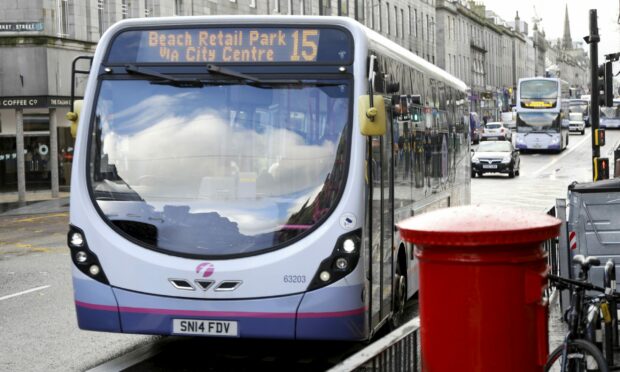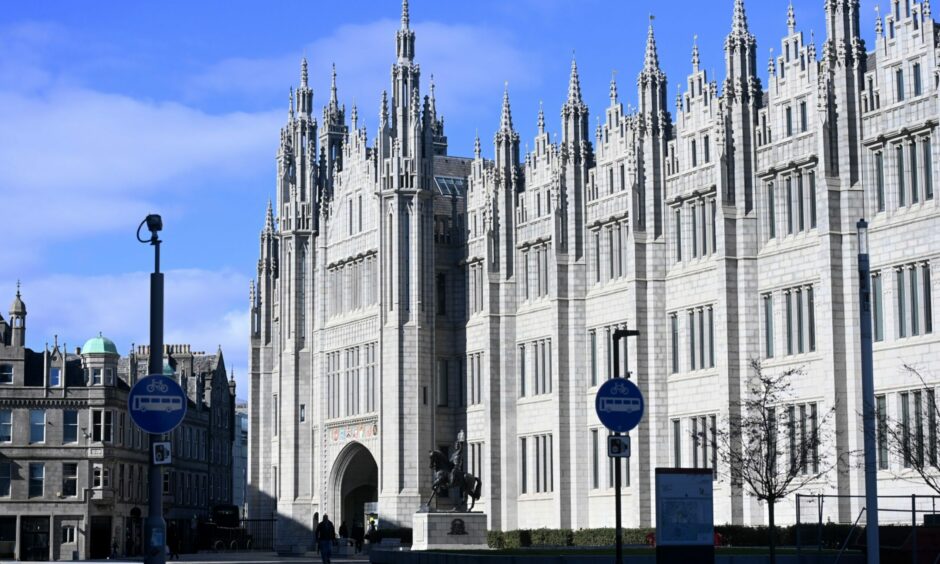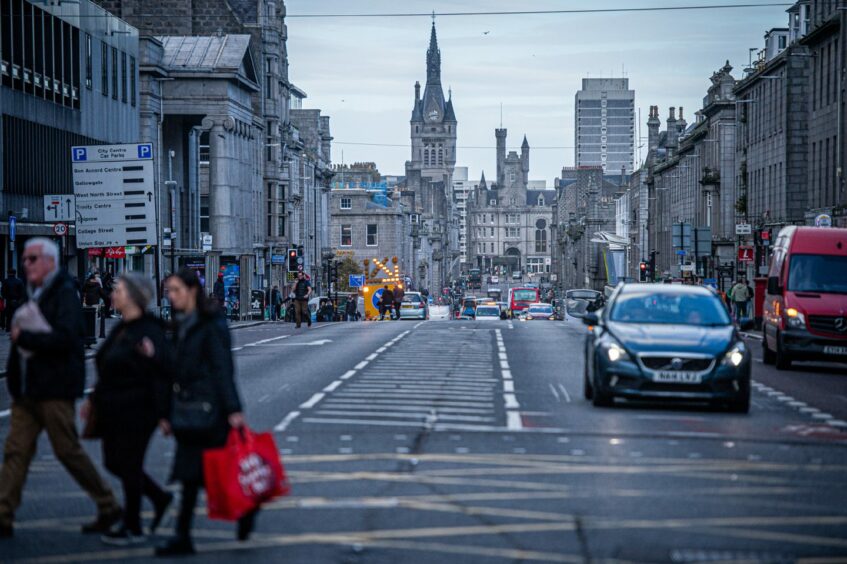Sir, – I am so highly delighted we are getting our Fittie bus back.
I use the bus a lot and I’ve been so tired walking up to Asda and back, or taking the bus up to town.
At this time of year, having to walk from Asda home to Fittie left me cold, wet and shattered.
I am 75 years old but I know I am speaking for young and old who were complaining there was no bus.
Now that winter is around the corner, they were even saying it was putting them off going out.
So I thank the bus service for reinstating it and hope it continues coming to Fittie.
Fittie Quine.
Discussion and cooperation paramount for saving the planet
Sir, – Charles Wardrop’s letters (June 14, November 15) on climate change serve the public badly, giving us science illiterates excuse to relax our care over energy usage and climate, because climate change might all be due to “new realisation on clouds and sunspots”.
But these have been recognised for at least 50 years and are not ignored by climate scientists.
What will always be “new” are advances in modelling complexity, particularly the different effects of water vapour and cloud variation, to reduce uncertainty.
The range of uncertainty has indeed narrowed, so the high-end cases are less severe, but the likely mid-range and low-end cases are higher than the temperatures debated at COP27.
Charles Wardrop uses minority reports questioning climate models to infer that models are unusable.
Such is gross falsity, as widely peer-endorsed models (UK Met Office, NCAR, Nasa) all recognise climate as directly affected by CO2 increases. It’s the range of uncertainty, not the probability, that is hard to calibrate because of the major part that water plays in the loop. The topic is too difficult for us laymen to judge all technical papers, so a useful link on the Nasa website (https://www.nasa.gov/mission_pages/sunearth/solar-events-news/Does-the-Solar-Cycle-Affect-Earths-Climate.html) gives a simple account of why solar does not explain the level of temperature changes, with solar irradiance on earth varying by only 0.15% cyclically, in direct answer and refute of the references (Ratzer et al) used by Charles Wardrop.
By all means, draw attention and debate over “huge costs” of doing something to try and mitigate the human and massive costs of growing actual disasters, but I object to narrow Trumpian-like certainty in dismissing our major science institutes warnings.
Such is like saying “do nothing, cannot control weather, so even more of you are going to die anyway”.
The best scientists and doctors do not claim certainty, but act on probability.
In the end, I feel we are on the same side – discussion and cooperation remain paramount.
Mike Hannan. Earlswells Place, Aberdeen.
Scottish revenue sums don’t add up
Sir, – I wonder where Herbert Petrie gets his revenue figures from or indeed dreams up.
Scotland raised £73.8 billion in 2021-22 and that includes North Sea revenue. Scottish spending amounted to £97.5 billion.
I would say to Mr Petrie “you do the maths” but that is not his strong suit.
Stewart Wight. Haddo, Aberdeenshire.
Learn a lesson on education money
Sir, – With reference to Finlay Mackintosh’s letter (November 14) on health care cash, I believe the guidance and money comes from the Scottish Government for our health care and schools and education – the two most important sectors of our country. Keep people healthy and educate well in order to grow a strong and well-informed people to guide us to great things.
Where has the money gone which has actually been absent in those sectors?
Sybil Wilkie. Mansefield Place, Banchory.
We are all Jock Tamson’s bairns
Sir, – Amid the never-ending diet of stories concerning the elation – or more commonly the anguish and uncertainty – of those leaving school to take their first steps in adulthood by going to “uni”, a story in the P&J (November 11) gives much-needed coverage to those who seek a different but no less important pathway in life.
Two young plumbers from the north-east are to join the battle to be named top in the UK with a place in the world final for the winner and the chance to emulate or better the fine achievement of another young man from the area who finished a highly credible seventh only a few years ago.
In so many minds those who choose a career as a tradesperson in preference to academic qualification are considered as having underachieved even though their job satisfaction and financial security will never be achieved by many university graduates.
Thought even further down the ladder of attainment are those who do the menial tasks in society such as the people who arrive in all weathers to empty our bins, in my eyes as vital in disease control as the white-coated bacteriologist in a hospital laboratory – we have only to look back at the sight of rats rummaging through refuse bags during the recent strike.
My degree that allowed me to enjoy a fulfilling career in the NHS, the certificates held by the plumber who fits a new cistern in my bathroom or the letter of employment of the person who unfailingly empties my bin – each leading to an occupation that is important in its own way, as are all forms of employment, all contributing to the function of society.
Ivan W. Reid. Kirkburn, Laurencekirk.
Qatar is really not Fifa’s finest hour
Sir, – It is somewhat bizarre that such a fuss is being made now about Qatar hosting the football World Cup. Qatar was awarded this honour on December 2 2010.
Everyone knew then what the climate of the place was like. I visited it briefly in January 2011, and it was very hot indeed. It was obvious then that the original plan to hold the tournament in summer 2022 was nothing short of mad.
At the same time, it was no secret that foreign workers in Qatar, as in other Gulf states, were treated badly. And it was not only construction workers. In Abu Dhabi, our driver told us that he could never become a citizen because his parents had been born in Pakistan.
If he lost his job, he could be deported to Pakistan, a country he had never visited. His daughter could never become a citizen of Abu Dhabi, and he had to pay for her schooling because he and his family were not citizens. They also, as non-citizens, had to pay for their health care.
It was clear at the time when Qatar was chosen as the 2022 venue that there were serious reservations about the suitability of the place, but they were minimised at the time of selection and ignored until the tournament was imminent. It is not Fifa’s finest hour.
Jill Stephenson. Corstorphine, Edinburgh.
Check facts before you start writing
Sir, – It was depressing to read the poor information in Herbert Petrie’s letter on November 15.
If you are going to quote financial figures I would suggest as a basic courtesy to any other reader that some basic checks are first conducted to verify that the figures quoted are at least close to being in the right ballpark and relevant to the situation.
What on earth is the economic connection between Scotland and New Zealand?
I suspect this has been borrowed from the trivia presented by Nicola Sturgeon as her prime justification for a repeat referendum on independence on the simple principle that if other countries have independence, then so should Scotland – but does it make economic sense now?
Scotland was independent 300-plus years ago. A bankrupt Scotland saw how successful an independent England was becoming at the start of the industrial revolution that they agreed to join the expanding trade of the British Empire and enjoyed the resulting success.
How much public spending and revenue is there for Scotland? During 2021-22 tax revenue generated in Scotland amounted to about £73.8 billion, including North Sea oil revenue. During the same period, Scotland benefited from about £97.5 billion in public spending, a deficit of £23.7 billion.
In 2020-21, Scotland (including a geographical share of North Sea revenue) raised £62.8 billion compared to £99.2 billion of public spending, a higher deficit of £36.4 billion. Note that, in particular, spending was higher due to the helpful UK response to the coronavirus pandemic. Figures for previous years are also available in the GERS publication for comparison. It should be no surprise to anyone.
I would seriously recommend full fact analysis of the taxation revenues in Scotland and UK subsidies to any and all with an open mind – because Scotland raises slightly less tax per person than across the UK as a whole, when this happens Scotland essentially receives more back than it originally put in.
The method used to calculate this is called the Barnett formula, and when it was put into place in the 1970s Scotland had a higher level of public spending per person than England.
This essentially locked in this disparity, although in theory it was supposed to slowly reduce.
David Philip. Knockhall Way, Newburgh.
Get council staff back in the office
Sir, – It is high time council employees and civil servants returned to their offices. Trying to get through to someone by phone at Aberdeen City Council’s Marischal College is a long, frustrating task.
When you do eventually get through to the department you need, you can’t get someone to help because they “are not in the office today”.
The office space is being paid for but where are they?
Too many people have got used to a lounging about at home, work-when-I-feel-like-it attitude.
The quote in Saturday’s Press & Journal, “the council yesterday confirmed it would continue to put employees first” says it all.
What about putting the public first for a change? Blaming Covid as an excuse for this continued absence from the workplace has long worn out.
Many private companies have their workers back.
If our councils and the Scottish Government got people back in the workplace it would not only support struggling local businesses but it would also mean the long-suffering public they are supposed to serve get a service they deserve.
Mrs P Sutherland. Esslemont Avenue, Aberdeen.
Senior cops should follow their orders
Sir, – Home Secretary Suella Braverman urged chief constables to take a firmer line with the Just Stop Oil demonstrators.
Chief Constable Chris Noble, who leads the National Police Chiefs Council, said he would not do this, saying “we’re not going to arrest our way out of environmental protest”.
Other senior police officers say they are powerless to act against the Just Stop Oil demonstrators.
Change the word “powerless” to “unwilling” and the true picture emerges.
These “unwilling” officers on eye-watering salaries and building up gold-plated pensions at taxpayers’ expense should be dismissed for disobeying a direct order.
No compensation, no enhanced pension.
Clark Cross. Springfield Road, Linlithgow.
‘City centre is not nice place’
Sir, – RE the article in the Evening Express about antisocial behaviour in the city centre.
I too have witnessed the antisocial behaviour on Union Street/St Nicholas Street rooftop gardens beside Marks and Spencer on at least two different Saturday afternoons.
Mostly girls, I might add, aged I guess between 12/14. Groups of them just hang around taunting other young girls.
At one point they chased two girls through St Nicholas Centre.
It is intimidating for shoppers because these girls congregate in quite large groups… in my opinion just spoiling for trouble.
I’ve seen two elderly ladies turn back from going into M&S or use hole-in-wall cash machine, clearly intimidated by the “gangs” and street drinkers who seemed to have claimed this area.
I was always given to believe Aberdeen city centre is an area with very high CCTV coverage… yet these thugs seem to go unchallenged.
And is not the case street drinking is illegal?
Aberdeen city centre is not a nice place on Saturday afternoon.
I now go in very early on Saturday mornings get what I need and home again but it shouldn’t be like this.
I know it’s difficult to constantly police. But surely more can and should be done.
Jeanette Craig.



Conversation